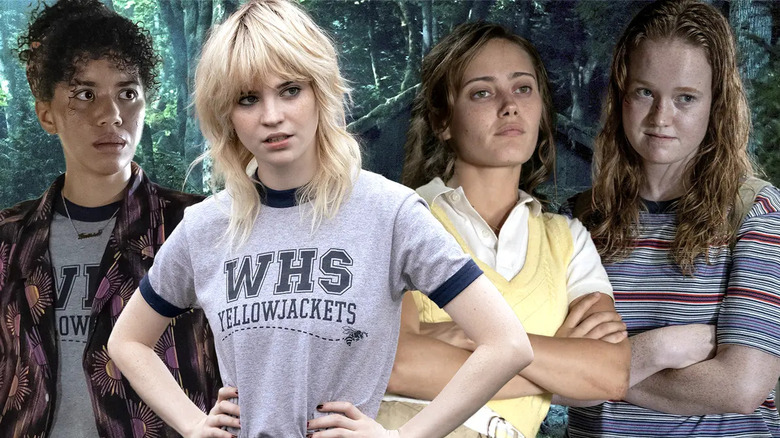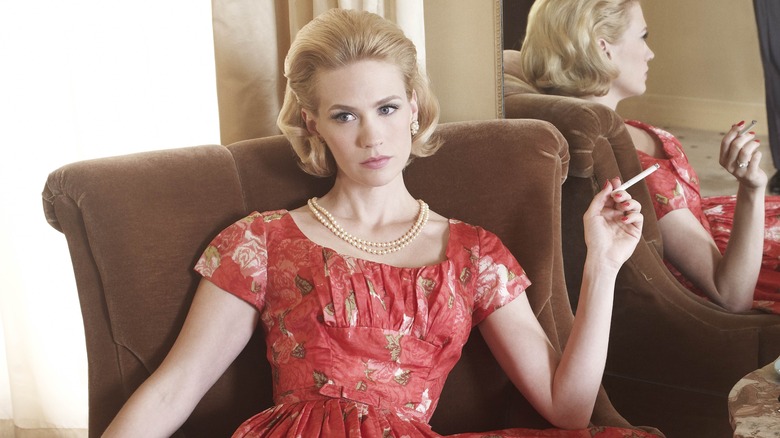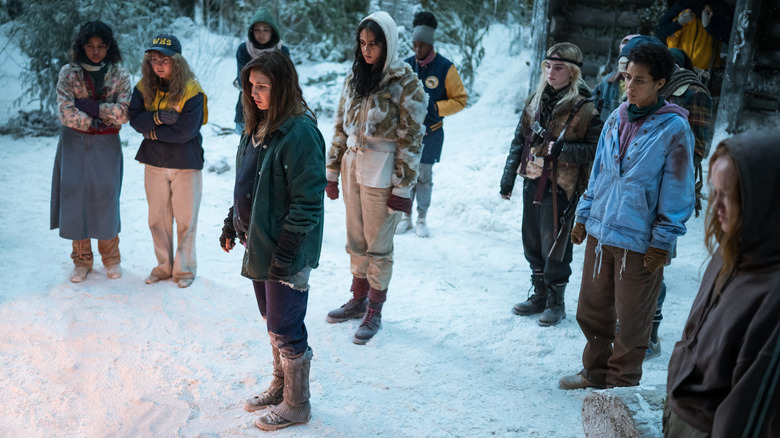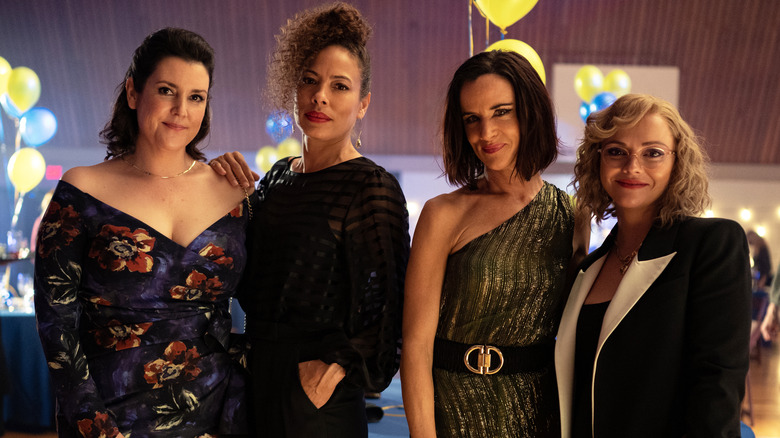Yellowjackets Proves Female Representation Isn't Just About Empowerment - It's Also About Flawed But Fascinating Women
You can describe the women who populate "Yellowjackets" in a lot of ways. Funny, determined, skilled, strong — manipulative, harsh, selfish, adulterous, and murderous. But the first word that comes to mind when you think of them probably isn't "girl power," even though much of the show takes place in the Spice Girls-drenched 1990s.
And yet every single one of them is strong — and weak — in equal measures. Take Shauna Shipman (Melanie Lynskey) for example. She's both selfish enough to sleep with her best friend's boyfriend and generous enough to do whatever she can to help Taissa Turner (Tawny Cypress) and Natalie Scatorccio (Juliette Lewis) as they struggle with the aftereffects of the plane crash they all survived. Shauna, too, takes help from the other women, faithful to their old bonds and sometimes struggling against them. Even the dead ones — right, Jackie?
Shauna tries to be a good mom but her daughter Callie Sadecki (Sarah Desjardins) is in a state of permanent rebellion that keeps them apart: their relationship is a tangle of love and hate. She attempts to be a good wife, but she's so bored with the relationship that cheating comes easier to her than going to a marriage counselor, and murdering a completely innocent man is easier than honesty. She is easy to root for. You won't always like her, but that makes her a three-dimensional person instead of a plastic angel. And so they all are: addicted Natalie, tightly-wound politician Taissa, manipulative nurse Misty Quigley (Christina Ricci) and stuck-in-the past Van Palmer (Lauren Ambrose) — all have plusses and minuses to them. Their struggles keep viewers glued to the tube, instead of promising them the moon and giving them shallow representation.
Flawed characters have come a long way
Not too long ago, to be a complex female character meant being insulted by a show's audience. Betty Draper (January Jones) of "Mad Men" fame, we're calling your name.
Before her time, female characters were expected to behave in a ladylike manner at all times and were often secondary features to the men in the cast. When representation finally began to evolve, they were expected to be lovable, at a bare minimum. In the world of dramas you could own your own car and run your own life, but you had to be a pleasant, nigh-on-bubbly person, like the characters of "Charlie's Angels" or "Honey West." In the 1990s, characters like Dana Scully on "The X-Files" began to change that perception, but fans of dramas would largely reject complex characterization of female characters well into the 2010s.
Take "Breaking Bad" for example. Skyler White (Anna Gunn) was castigated by the show's fanbase for refusing to let Walter White (Bryan Cranston) do whatever he wanted with his life — which was, let's remember, creating a drug empire, the existence of which endangers the lives of their two children. Skyler is not a perfect person, though, and that's the point. She makes a number of ethically ambiguous decisions. But devotees of "Breaking Bad" did not let her off easy, to put it lightly.
"Yellowjackets," though, is proof positive of a pop culture evolution — because now, we are able to have a landmark dramatic series about a group of women who may be messy, unlikable, or (in the case of the snowbound Yellowjackets) even cannibalistic, and still draw huge viewership. We've come a long way since "Breaking Bad."
Bland representation isn't nearly as important as what Yellowjackets offers
There's an even bigger reason why the ladies of "Yellowjackets" prove that flawed representation is much more interesting than bland goody-goody types who are strong but gushingly sweet — with the latter, there's not much room for them to grow and change as the show goes on. While it's arguable that Season 2 of "Yellowjackets" has begun to change the show's central figures into worse — or at least more distressed — people than they were in Season 1, that just makes them more interesting. In spite of everything, we still want them to succeed and thrive, even though whatever they encountered in the woods doesn't want them to make it to dinner.
It's that fearless messiness — the hunger they all share, which manifests in multiple ways in both their teenage and adult lives — that makes them all so repulsively appealing and complex. They do not blindly support each other, and sometimes their attempts at covering things up or helping each other can be massively stressful — hello, Lottie Matthews (Courtney Eaton). They aren't superwomen. And to be frank, the world has had enough of women who behave perfectly and strongly. The world loved characters like Sidney Bristow (Jennifer Garner) and Olivia Pope (Kerry Washington), but one can't picture them doing absolutely anything it takes to ensure their own freedom and survival like this gang. This show, meanwhile, is made great because the characters can be both devoted to each other and betray one another in a realistic way.
The fabulously flawed women of Yellowjackets helps make the show great
And that brings us to the ultimate question — how boring would the show be if everyone got along? The various insecurities, tensions, and problems are the exact factor that has given "Yellowjackets" such a beehive of devoted fans. The women in this series claw, fight, scream at the unfairness of the universe — and kick back at it. They make deals with the devil. They use their minds to get away from powerful cults. They try to control their circumstances but fail mightily at it. They do bad things, but they're not bad people. They never give up, even though the temptation's always there (well, not all the way). And even when they're bad, they're still interesting and relatable.
In a world of cardboard princesses and bland action heroines who look good, kick butt, but have motivations thinner than an after dinner mint, "Yellowjackets" is a revelation. Here's to difficult women being celebrated for their difficult ways, and not being punished for their malfeasance. Here's to complex, evil, good, fully flawed people.



